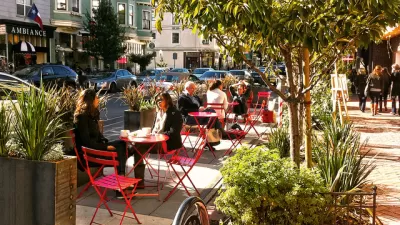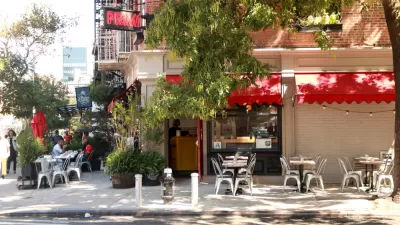The pandemic-era outdoor seating arrangements can stay, but a last-minute amendment lets business owners close them overnight.

San Francisco's Board of Supervisors "approved a modified version of the ordinance regulating the Shared Spaces program to allow mostly small businesses to continue to use public sidewalks and parking spots to bolster their businesses — and to close those spaces at night," marking a tempered victory for proponents of the "pandemic parklets" that sprang up over the last year and a half.
As reported by J.K. Dineen and Mallory Moench, despite arguments that keeping them open at night would preserve public space, the supervisors decided to allow businesses to close the parklets at night, citing concerns about noise and vandalism. "Over the past several months, the parklet program has come under scrutiny as elected officials grappled with how to regulate the hundreds of outdoor spaces that provided a lifeline for small businesses during the pandemic. In particular, board members sought to make sure that parklets would be accessible to disabled people and debated privatizing public space permanently."
Under the new rules, "[m]om-and-pop businesses will enjoy a two-year fee waiver for the program to help in economic recovery. The fees range from $1,000 to $3,000 for a single parking space, depending on the type of parklet, and will be required for formula chain stores."
FULL STORY: San Francisco's parklets are here to stay, but supes say they can close overnight

Planetizen Federal Action Tracker
A weekly monitor of how Trump’s orders and actions are impacting planners and planning in America.

Map: Where Senate Republicans Want to Sell Your Public Lands
For public land advocates, the Senate Republicans’ proposal to sell millions of acres of public land in the West is “the biggest fight of their careers.”

Restaurant Patios Were a Pandemic Win — Why Were They so Hard to Keep?
Social distancing requirements and changes in travel patterns prompted cities to pilot new uses for street and sidewalk space. Then it got complicated.

California Homeless Arrests, Citations Spike After Ruling
An investigation reveals that anti-homeless actions increased up to 500% after Grants Pass v. Johnson — even in cities claiming no policy change.

Albuquerque Route 66 Motels Become Affordable Housing
A $4 million city fund is incentivizing developers to breathe new life into derelict midcentury motels.

DC Area County Eliminates Bus Fares
Montgomery County joins a growing trend of making transit free.
Urban Design for Planners 1: Software Tools
This six-course series explores essential urban design concepts using open source software and equips planners with the tools they need to participate fully in the urban design process.
Planning for Universal Design
Learn the tools for implementing Universal Design in planning regulations.
Heyer Gruel & Associates PA
JM Goldson LLC
Custer County Colorado
City of Camden Redevelopment Agency
City of Astoria
Transportation Research & Education Center (TREC) at Portland State University
Camden Redevelopment Agency
City of Claremont
Municipality of Princeton (NJ)





























